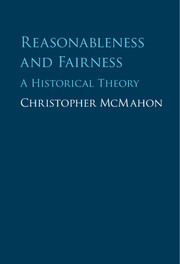Christopher McMahon, University of California, Santa Barbara, has published Reasonableness and Fairness: A Historical Theory (Cambridge University Press, 2016). Here from the publisher's website is a description of the book's contents.

We all know, or think we know, what it means to say that something is 'reasonable' or 'fair', but what exactly are these concepts and how have they evolved and changed over the course of history? In this book, Christopher McMahon explores reasonableness, fairness, and justice as central concepts of the morality of reciprocal concern. He argues that the basis of this morality evolves as history unfolds, so that forms of interaction that might have been morally acceptable in the past are judged unacceptable today. The first part of his study examines the notions of reasonableness and fairness as they are employed in ordinary practical thought, and the second part develops a constructivist theory to explain why and how this part of morality can undergo historical development without arriving at any final form. His book will interest scholars of ethics, political theory, and the history of ideas.
Relates moral reasoning to its historical context
Provides an account of reasonable disagreement, enabling readers to gain insight into the structure of moral, and especially political, disagreements
Develops a meta-ethical theory that bridges the divide between realist views and anti-realist views





No comments:
Post a Comment